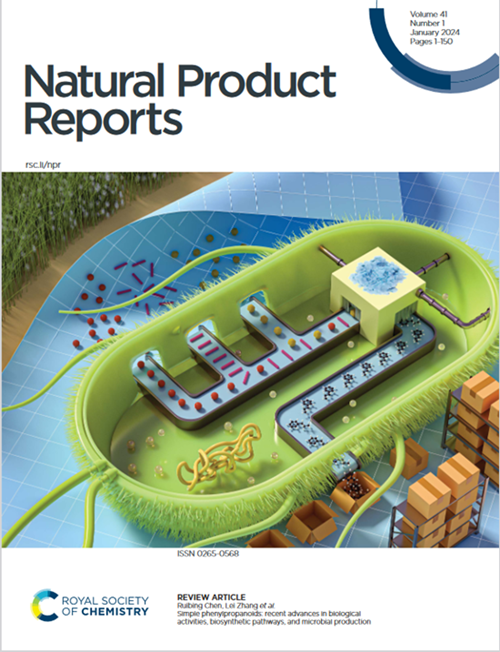开发抗炎药物的天然产物化合物类。
IF 10.2
1区 化学
Q1 BIOCHEMISTRY & MOLECULAR BIOLOGY
引用次数: 0
摘要
覆盖范围:到2025年初,抗炎天然产品的特权化合物类别是那些有许多报告成员具有抗炎特性的化合物。这些类别的鉴定与药物发现特别相关,因为它们可以作为开发有效和安全的抗炎药的有价值的起点。天然产物的特权化合物类别包括多酚,香豆素,labdane二萜,倍半萜内酯,异喹啉和吲哚生物碱,每一种都提供了各种分子支架和功能基团,能够与生物靶标进行不同的相互作用。从药物化学的角度来看,天然产物既是一种恩惠也是一种祸害。天然产物的多靶点特性在治疗多因素疾病(如炎症)方面是一个福音,但滥交、效力差和药代动力学特性是必须解决的重大障碍,以确保这些化合物可以有效地用作治疗药物。此外,关于其中一些天然产品的功效仍存在争议,这将继续使它们的使用两极分化。本文综述了六种特殊化合物类别的天然产物,讨论了它们作为抗炎药物的潜在用途和进一步开发的可能性。本文章由计算机程序翻译,如有差异,请以英文原文为准。
Privileged natural product compound classes for anti-inflammatory drug development
Covering: up to early 2025
Privileged compound classes of anti-inflammatory natural products are those where there are many reported members that possess anti-inflammatory properties. The identification of these classes is of particular relevance to drug discovery, as they could serve as valuable starting points in developing effective and safe anti-inflammatory agents. The privileged compound classes of natural products include the polyphenols, coumarins, labdane diterpenoids, sesquiterpene lactones, isoquinoline and indole alkaloids, each offering a variety of molecular scaffolds and functional groups that enable diverse interactions with biological targets. From a medicinal chemistry point of view, natural products are both a boon and a bane. The multi-targeting nature of natural products is a boon in the treatment of multi-factorial diseases such as inflammation, but promiscuity, poor potency and pharmacokinetic properties are significant hurdles that must be addressed to ensure these compounds can be effectively used as therapeutics. In addition, there are continued controversies regarding the efficacies of some of these natural products that will continue to polarise their use. In this review, examples of natural products of six privileged compound classes will be discussed for their potential use and possible further development as anti-inflammatory drugs.
求助全文
通过发布文献求助,成功后即可免费获取论文全文。
去求助
来源期刊

Natural Product Reports
化学-生化与分子生物学
CiteScore
21.20
自引率
3.40%
发文量
127
审稿时长
1.7 months
期刊介绍:
Natural Product Reports (NPR) serves as a pivotal critical review journal propelling advancements in all facets of natural products research, encompassing isolation, structural and stereochemical determination, biosynthesis, biological activity, and synthesis.
With a broad scope, NPR extends its influence into the wider bioinorganic, bioorganic, and chemical biology communities. Covering areas such as enzymology, nucleic acids, genetics, chemical ecology, carbohydrates, primary and secondary metabolism, and analytical techniques, the journal provides insightful articles focusing on key developments shaping the field, rather than offering exhaustive overviews of all results.
NPR encourages authors to infuse their perspectives on developments, trends, and future directions, fostering a dynamic exchange of ideas within the natural products research community.
 求助内容:
求助内容: 应助结果提醒方式:
应助结果提醒方式:


